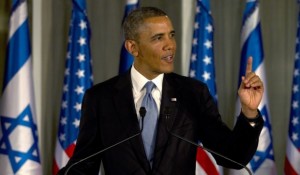 President Obama said Monday that any attempt by Syria to move or use its chemical weapons would change his administrations calculus in the region, evoking the possibility of more direct U.S. intervention in the conflict.
President Obama said Monday that any attempt by Syria to move or use its chemical weapons would change his administrations calculus in the region, evoking the possibility of more direct U.S. intervention in the conflict.Speaking at an impromptu news conference at the White House, Obama noted that he has not authorized military operations against Syria. But he said that any effort by President Bashar al-Assad to use chemical weapons would have significant consequences.
A look at the Syrian uprising one year later. Thousands of Syrians have died and President Bashar al-Assad remains in power, despite numerous calls by the international community for him to step down.
We have been very clear to the Assad regime, but also to other players on the ground, that a red line for us is we start seeing a whole bunch of chemical weapons moving around or being utilized. That would change my calculus, Obama said. That would change my equation. .?.?. Were monitoring that situation very carefully. We have put together a range of contingency plans.The presidents remarks represented his strongest language to date on how the United States might respond to contain Syrias chemical weapons arsenal. In July, he warned that Assad would be held accountable by the international community if he made the tragic mistake of deploying chemical munitions.
On Monday, an administration official said that Obama did not intend to flag any change in policy in his latest remarks and that the appetite for military intervention remains low.
But theres a deterrent effect in making clear how seriously we take the use of chemical weapons or giving them to some proxy force, said the official, who spoke on the condition of anonymity to be candid.
Obamas comments earlier this summer followed a suggestion from a spokesman for the Syrian Foreign Ministry that the Damascus government would deploy chemical munitions only in the case of foreign intervention in the countrys mounting civil war. At the time, the remarks were widely seen as a confirmation of Syrias chemical weapons capability.
Although Syria has never acknowledged the existence of its chemical weapons arsenal, it is thought to have stockpiles of mustard gas, VX and other nerve agents.
Accounts of international meetings on chemical weapons proliferation made public by WikiLeaks suggest that Syria amassed its chemical capabilities through trades with Iran and by procuring dual use precursor chemicals materials with civilian uses that can be utilized to generate chemical agents from Western countries.
Syria has been mired in conflict since protests inspired by the Arab Spring movement began in the country in March 2011. The United Nations places the death toll in Syria at nearly 18,000; the opposition says the figure is about 23,000.
The United States and other Western governments have resisted entreaties to supply the Syrian opposition with military support, but they have provided humanitarian assistance and some communications gear.
A U.N. monitoring mission, whose mandate expired at midnight Sunday, is withdrawing its remaining personnel from Syria this week.
The United States has been working with allies in the region to develop contingency plans against worst-case scenarios, such as deployment of chemical weapons. The planning has included detailed arrangements for securing chemical arms with Special Operations troops in the event that they are seized by militants.
Speaking after a summit with Turkeys foreign minister, Secretary of State Hillary Rodham Clinton said this month that officials were seeking to coordinate efforts.
We need to get into the real details of such operational planning. It needs to be across both of our governments, she said.
Clinton added that the prospect of Syrias use of chemical weapons was particularly troublesome.
What would that mean in terms of response, humanitarian and medical emergency assistance, and, of course, what needs to be done to secure those stocks from ever being used or falling into the wrong hands?
U.S. officials have said that they are working with Turkey and Jordan to monitor Syrias chemical weapon sites and have been in discussions with Israel on what steps must be taken to ensure the sites are secure.
By The Washington Post
The Iran Project is not responsible for the content of quoted articles.










